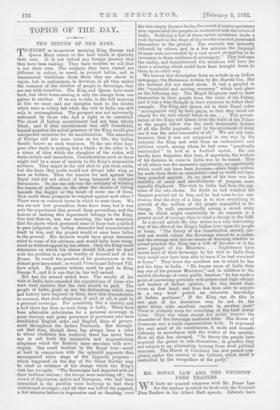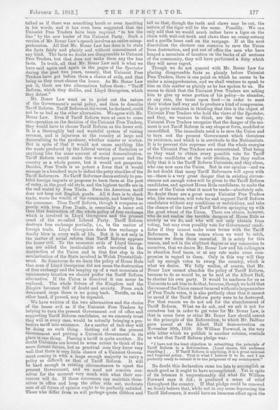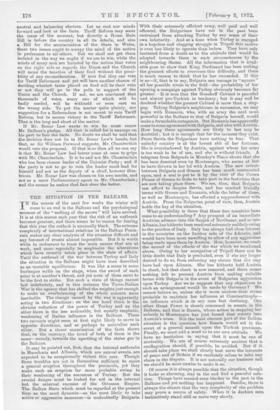MR. BONAR LAW AND THE UNIONIST FREE TRADERS.
WE have no quarrel 'whatever with Mr. Bonar Law for the manner in which he dealt with the Unionist Free Traders in his Albert Hall speech. Liberals have talked as if there was something harsh or even insulting in his words, and it has even been suggested that the Unionist Free Traders have been. required " to toe the line " by the new leader of the Unionist Party. Such a version of Mr. Boner Law's speech involves an entire misap- prehension. All that Mr. Bonar Law has done is to state the facts fairly and plainly and without concealment of any kind. The facts no doubt are disagreeable to Unionist Free Traders, but that does not make them any the less facts. In truth, all that Mr. Bonar Law said is what we have said again and again in the pages of the Spectator during the past two years, namely, that Unionist Free Traders have got before them a choice of evils, and that being so they must choose the lesser. As Mr. Boner Law put it, there are two alternatives before them: " Tariff Reform, which they dislike, and Lloyd Georgeism, which they detest."
Mr. Bonar Law went on to point out the nature of the Government's social policy, and then to describe Tariff Reform. Tariff Reformat the worst, he declared, could not be as bad as the other alternative. We agree with Mr. Bonar Law. Even if Tariff Reform were at once to come into operation on the decision of the Unionist Free Traders, they would have to choose Tariff Reform as the lessor evil. It is a thoroughly bad and wasteful system of raising revenue, and is injurious to the country at largo and demoralizing to the producer, whether master or worker. But in spite of that it would not cause anything like the waste produced by the Liberal version of ociahsm or anything like the same amount of social demoralization. Tariff Reform would make the workers poorer and the country as a whole poorer, but it would not pauperize. Besides, Free Trade is so potent a force that it would manage in a hundred ways to defeat the petty shackles of the Tariff Reformers. No Tariff Reformer dares entirely to pro- hibit foreign imports or proposes to burn them at the port of entry, in the good old style, and the highest tariffs are in the end scaled by Free Trade. Even the American tariff does not keep out English goods. All it does is to check trade, waste the wealth of the community, and heavily fine the consumer. Thus Tariff Reform, though it compares so poorly with true Free Trade, is essentially a lesser evil than that destruction of the whole policy of free exchange which is involved in Lloyd Goorgeism and the present creed of the so-called Liberal Party. Tariff Reform destroys free exchange partially, i.e., in the matter of foreign trade. Lloyd Georgeism deals free exchange a deadly blow in every walk of life. But it is not only in the matter of social reform that Tariff Reform appears the lesser evil. To the economic evils of Lloyd George- ism are added the incalculable evils involved in the destruction of the Union and in that first step in the secularization of the State involved in Welsh Disestablish- ment. So disastrous do we deem the policy of Home Rule that oven if Lloyd Georgeism did not mean the destruction of free exchange and the heaping up of a vast mountain of unnecessary taxation we should prefer the Tariff Reform alternative. If the Union is dissolved it can never be replaced. The whole future of the Kingdom and the Empire becomes full of doubt and anxiety. From such downward steps there is no going back. Tariffs, on the other hand, if passed, may be repealed.
We have written of the two alternatives and the choice of the lesser evil as if the Unionist Free Traders by helping to turn the present Government out of office and supporting Tariff Reform candidates, as we sincerely trust they will in every case, would be actually bringing a pro- tective tariff into existence. As a matter of fact they will be doing no such thing. Getting rid of the present Government and putting a, Unionist Government in its place is one thing. Passing a tariff is quite another. No doubt Unionists are bound to some extent to think of the more distant future, but as practical men they know very well that there is very little chance of a Unionist Govern- ment coming in with a large enough majority to carry a policy so difficult as that of Tariff Reform. It will be hard enough in existing circumstances to upset the present Government, and we need not concern our- selves for the moment very much with what their suc- cessors will do. If those successors can maintain them- selves in office and keep the other side out, moderate men of all forms of opinion ought to be perfectly satisfied. Those who differ from us will perhaps quote Gibbon and tell us that, though the teeth and claws may be cut, the nature of the tiger will be the same. Possibly. We caa only add that we would much rather have a, tiger on the chain with well-out teeth and claws than an orang-outang and a gorilla loose and on the rampage. If at the next dissolution the electors can contrive to save the Union from destruction, and put out of office the men who have heaped a mountain of taxation on the backs of all sections of the community, they will have performed a duty which they will never regret. - Though we do not quarrel with Mr. Bonar Law for placing disagreeable facts so plainly before Unionist Free Traders, there is one point on which he seems to be under a, misapprehension, and we shall venture to speak to him on this matter as plainly as he has spoken to us. He seems to think that the Unionist Free Traders are asking him to give up some portion of his policy—to abandon, at any rate, the taxes upon food — in order to meet their wishes half-way and to produce a kind of compromise. He is quite mistaken in thinking that this is the object of Unionist Free Traders who hold the views of the Spectator, and they, we venture to think, are the vast majority. Unionist Free Traders recognize that the danger of the mo- ment is not Tariff Reform in any shape or form, modified or unmodified. The immediate need is to save the Union and to turn out the present Government which threatens its existence, and which is in servitude to the Nationalists. It is to prevent this supreme evil that the whole energies of the Unionist Free Traders are concentrated. That being so they want to obtain every possible vote for Tariff Reform candidates at the next election, for they realize fully that it is the Tariff Reform Unionists, and they alone, who can now save the Union. But in our opinion—and we do not doubt that many Tariff Reformers will agree with us—there is a very great danger that in existing circum- stances not enough votes will be given to the Tariff Reform candidates, and against Homo Rule candidates, to make the cause of the Union what it must be made—absolutely safe. No doubt there are a groat many Unionist Free Traders who, like ourselves, will vote for and support Tariff Reform candidates without any conditions or restrictions, and take the chance of the tares of Tariff Reform springing up with the good wheat of the Union. There are others, however, who do not realize the terrible dangers of Home Rule as acutely as we do, and who will not only abstain. from voting, but may even possibly vote for Government candi- dates if they cannot make some terms with the Tariff Reformers. It is these voters whom we want to catch, because we deem them essential. It is solely for this reason, and not in the slightest degree as any concession to ourselves, that we desire Mr. Bonar Law and his colleagues to abandon food taxes, or at any rate make some com- promise in regard to them. Only in this way will they call up enough votes to sweep the country, which is what we desire. We fully realize, of course, that Mr. Bonar Law cannot abandon the policy of Tariff Reform, because to do so would be, as he said at the Albert Hall, to shatter his own party. It would be madness for us as Unionists to ask him to do that, because, though we hold that the cause of the Union cannot be saved without a large number of Free Trade votes, it is also perfectly clear that it cannot be saved if the Tariff Reform party were to be destroyed. For that reason we do not ask for the abandonment of Tariff Reform. What we do ask, and we ask it not for ourselves but in order to get votes for Mr. Bonar Law, is that in some form or other Mr. Boner Law should assent to the principle of the Referendum, to which Mr. Balfour gave assent at the Albert Hall demonstration on November 30th, 1910. Sir William Forwood, in the very able letter which we publish in another column, reminds us what that Tariff Reform pledge was : "I have not the least objection to submitting the principle of Tariff Reform to a Referendum. [Loud cheers, the audience standing.] . . . If Tariff Reform is anything, it is a great national and Imperial policy. That is what I believe it to be, and I am perfectly ready to submit it to the judgment of my countrymen."
No doubt this declaration came too late to accomplish as much good as it ought to have accomplished. Yet in site of its lateness it unquestionably did what Sir William Forward says it did z it produced a sense of relief throughout the country. If that pledge could be renewed we firmly believe that, while not in any sense depressing the Tariff Reformers, it would have an immense effect upon the neutral and balancing electors. Let us cast our minds forward and look at the facts. Tariff Reform may seem the issue of the moment, but directly a Home Rule Bill is before the country in all its details, and also a Bill for the secularization of the State in Wales, these two issues ought to occupy the mind of the nation in preference to all others. But we shall not get them isolated in the way we ought if we are to win, while the minds of many men aro haunted by the notion that votes on the right side as regards the Union and the Church will mean the taxation of their food without the possi- bility of any reconsideration. If men feel they can vote for Tariff Reformers and yet will have another chance of deciding whethel' taxes placed on food will be their ruin or not they will go to the polls in support of the Union and the Church. If not, we are convinced that thousands of votes, every one of which will be badly needed, will be withheld or even cast on the wrong side. To put the matter quite plainly, our suggestion for a Referendum is not meant to ruin Tariff Reform, but to secure victory to the Tariff Reformers. That is the long and short of the matter.
If Mr. Bonar Law wants to win he must renew Mr. Balfour's pledge. All that is called for is courage on his part to face the facts. No doubt we shall be told that the decision does not lie in Mr. Bonar Law's hands, but that, as Sir William Forwood suggests, Mr. Chamberlain would veto the proposal. If that is so then all we can say is that Mr. Bonar Law bad better come at once to grips with Mr. Chamberlain. It is ho and not Mr. Chamberlain who has been chosen leader of the Unionist Party ; and if the party is not to go to ruin the leader must lead for himself and not as the deputy of a chief, however illus- trious. Mr. Boner Law was chosen on his own merits, and not as a mere Parliamentary agent to Mr. Chamberlain; and the sooner he makes that fact clear the better.












































 Previous page
Previous page